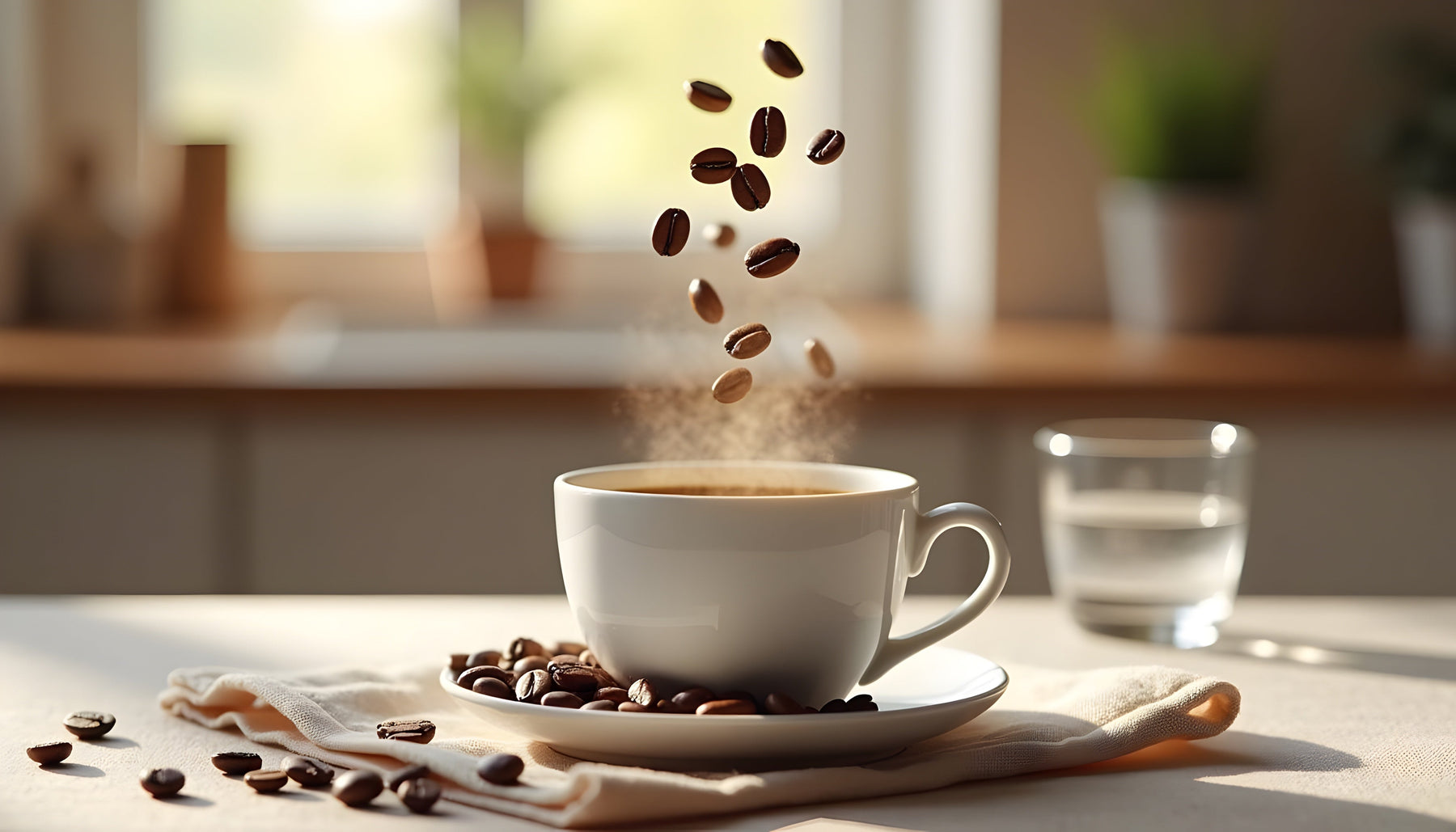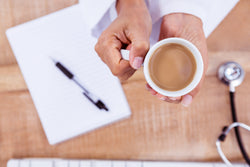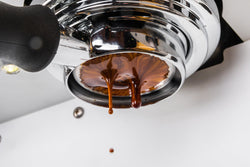
The Ultimate Guide to Caffeine Content: Coffee, Tea & Decaf
Key Takeaways
- Caffeine content varies widely by beverage type and preparation: Espresso is highly concentrated (63 mg per shot), filter coffee ranges from 95 to 165 mg per cup, while instant coffee and decaf contain significantly less caffeine.
- Tea offers a milder caffeine boost compared to coffee: Black tea contains 40–70 mg, green tea 30–50 mg per cup, and most herbal teas are naturally caffeine-free, making them ideal low-caffeine alternatives.
-
Moderation is essential to balance caffeine’s benefits and risks: While caffeine enhances alertness, mood, and performance, excessive intake can lead to insomnia, anxiety, and dependency.
Understanding Caffeine Content
Understanding caffeine content in your favourite beverages is essential for making informed choices about your health and energy levels. Whether you're a dedicated coffee enthusiast or a tea lover, knowing how much caffeine is in your cup can help you manage your intake effectively.
In this comprehensive guide, we’ll explore caffeine content across various coffee drinks, teas, and decaf options, dispelling myths and providing you with the science behind it all. We’ll also dive into how caffeine affects your body, helping you make mindful decisions about your caffeine consumption.
What Is Caffeine?
Caffeine is a natural stimulant that primarily affects the brain and central nervous system. Found in coffee beans, tea leaves, cacao pods, and other plants, caffeine is best known for its ability to increase alertness and reduce fatigue. It works by blocking adenosine, a neurotransmitter that promotes sleep, which results in heightened levels of dopamine and norepinephrine in the brain.
This process boosts focus, energy, and mood, which is why many people rely on a cup of coffee or tea to start their day. The caffeine content in beverages varies depending on several factors, including the type of drink, brewing method, and serving size. But how much caffeine are we consuming when we reach for our favourite coffee or tea? Let’s break it down.
Caffeine in Coffee
Coffee is widely recognised as one of the most popular sources of caffeine. However, the amount of caffeine in coffee can vary significantly depending on the type of coffee, the preparation method, and even the brand you choose.
Espresso
Espresso is the foundation of many beloved coffee beverages, including lattes, cappuccinos, and Americanos. On average, a single shot of espresso (30 ml) contains approximately 63 mg of caffeine. Despite its small size, espresso is often seen as one of the most potent coffee drinks in terms of caffeine per ounce. This is because espresso is brewed under high pressure, which results in a concentrated extraction of both flavour and caffeine.

Image: Our Espresso Classico Italian Coffee Beans are our recommendation for those who love a bold and classicly flavoured espresso coffee.
Factors Affecting Espresso Coffee Caffeine Content
- Coffee Bean Type: Arabica and Robusta are the two main types of coffee beans. Robusta beans generally contain twice as much caffeine as Arabica beans, giving Robusta a stronger, more bitter taste.
- Roast Level: Surprisingly, lighter roasts often have slightly higher caffeine levels by weight than darker roasts. This is because dark-roasted beans lose mass during the roasting process, but by volume, both light and dark roasts have similar caffeine content.
- Brewing Method: The amount of pressure used to brew the espresso will also influence its caffeine content. Higher pressure extracts more caffeine.
For additional information on this topic, read the following article:
Filter Coffee
Filter coffee, also known as drip coffee, is brewed by slowly dripping hot water over ground coffee. The caffeine content in a typical 8 oz (240 ml) serving of filter coffee ranges from 95 mg to 165 mg, depending on several factors such as the brewing method, grind size, and the coffee-to-water ratio.
Factors Affecting Filter Coffee Caffeine Content
- Grind Size: Finer coffee grounds lead to faster extraction, which can result in higher caffeine content.
- Brew Time: Longer brewing times, such as with French press or pour-over methods, can extract more caffeine.
- Water Temperature: Water that is too hot or too cold can impact the efficiency of caffeine extraction.
For additional information on this topics, read the following article:
Instant Coffee
Instant coffee typically contains between 30 mg to 90 mg of caffeine per 8 oz (240 ml) cup, making it a milder option compared to brewed coffee. The caffeine content can vary depending on the brand and how strong the coffee is brewed.
Factors Affecting Instant Coffee Caffeine Content
- Brand and Strength: Different brands use varying amounts of coffee in their instant coffee, which affects the caffeine content.
- Brewing Method: Instant coffee is typically brewed by mixing the granules with hot water, so how concentrated the mixture is will determine its caffeine levels.
| Coffee Type | Typical Serving Size | Average Caffeine Content |
| Espresso | 30ml (1 oz) | 63 mg |
| Drip Coffee | 240ml (8 oz) | 95 mg |
| Cold Brew | 240ml (8 oz) | 100-120 mg |
| Instant Coffee | 240ml (8 oz) | 30-90 mg |
Table: Estimated caffeine content in four popular coffee extraction types. Caffeine content varies, so it's important to know how much you're getting.
Decaf Coffee
Despite its name, decaffeinated coffee still contains small amounts of caffeine, generally between 2 mg to 15 mg per 8 oz (240 ml) cup. The decaffeination process, which uses water, solvents, or carbon dioxide to remove caffeine from the beans, does not fully eliminate all traces of caffeine (removing roughly 97%).
How the Decaffeination Process Affects Caffeine Content
The method used to decaffeinate the coffee will determine how much caffeine remains. For example, the Swiss water process tends to retain slightly more caffeine than the solvent-based method. The bean type also plays a role in how much caffeine is left in the decaf coffee.
Caffeine in Tea
While coffee is often the go-to source for caffeine, tea also contains varying amounts of caffeine, depending on the type and brewing method.
Black Tea
Black tea typically contains between 40 mg and 70 mg of caffeine per 8 oz (240 ml) serving. It’s the most caffeinated type of tea and is commonly consumed for its rich flavour and energising effects.
Factors Affecting Black Tea’s Caffeine Content
- Brewing Time: The longer tea is brewed, the more caffeine is extracted.
- Tea Leaf Size: Larger tea leaves release caffeine more slowly, while finely cut leaves extract more caffeine quickly.

Image: Madura's English Breakfast Tea Bags is our pick for those who love to enjoy a black tea and some cake from the comfort of their own home.
Green Tea
Green tea usually contains less caffeine than black tea, with an average of 30 mg to 50 mg of caffeine per 8 oz (240 ml) serving. Despite its lower caffeine content, it’s often preferred for its mild flavour and numerous health benefits.
Factors Affecting Green Tea’s Caffeine Content
- Temperature: Brewing green tea at a lower temperature (around 70°C to 80°C) will help extract less caffeine, which is ideal for those who prefer a lighter tea.
- Steeping Time: Green tea should be steeped for a shorter time than black tea to avoid bitterness and over-extraction of caffeine.

Image: Madura also have a delicious Green Tea which is suitable for anyone who likes a little less caffeine in their cup!
Herbal Tea
Most herbal teas, such as chamomile, peppermint, and rooibos, are naturally caffeine-free, as they do not come from the Camellia sinensis plant. However, some blends, like yerba mate, do contain caffeine.
The Health Effects of Caffeine
Caffeine has both positive and negative effects on the body, depending on the amount consumed and individual tolerance. The question of whether caffeine and coffee is good for you is highly researched and debated. From what we know:
Positive Effects
- Improved Mental Alertness: Caffeine boosts concentration and cognitive function, helping you stay alert and focused.
- Mood Enhancement: Moderate caffeine intake can enhance mood and provide a sense of well-being.
- Increased Physical Performance: Caffeine is known to improve athletic performance by increasing adrenaline levels and releasing fatty acids from fat tissues.
Negative Effects
- Insomnia: Consuming caffeine late in the day can disrupt sleep patterns, leading to insomnia.
- Anxiety: High doses of caffeine can trigger feelings of anxiety and jitteriness in some individuals.
- Dependence: Regular caffeine use can lead to physical dependence, and sudden cessation may cause withdrawal symptoms like headaches and irritability.
Understanding your caffeine tolerance and moderating intake is key to reaping the benefits while minimising the risks.
Article: For more on this topic, read Healthline's article titled What is Caffeine?
How to Moderate Caffeine Intake
While caffeine offers numerous benefits, it’s essential to moderate your intake to avoid side effects such as anxiety and sleep disturbances. Here are some tips for managing your caffeine consumption:
- Switch to Decaf: If you enjoy the taste of coffee but want to reduce your caffeine intake, try decaf or half-caf options.
- Opt for Tea: Tea generally has lower caffeine content than coffee, so switching to tea can help reduce your intake without sacrificing flavour.
- Limit High-Caffeine Drinks: Be mindful of beverages like energy drinks and large-sized coffees, which can have extremely high caffeine content.
Conclusion
Understanding the caffeine content in your favourite beverages is crucial for managing your health and energy levels. Whether you prefer espresso, filter coffee, tea, or decaf, each beverage offers a unique experience with varying levels of caffeine. By being mindful of how much caffeine you’re consuming, you can optimise your intake for better performance and well-being.
For more detailed information, explore our articles on Is Coffee Good for You? and Does Tea Have Caffeine?. If you’re looking for decaf options, our guide on Decaf Coffee offers everything you need to know.
Additional Reading
Our knowledge doesn't stop there... Take a look at more caffeine and health related content from our blogs!
- Is Coffee Good For You?
- Does Tea Have Caffeine?
- How Much Caffeine In Instant Coffee?
- How Much Caffeine Is In Espresso Coffee?
- Does Filter Coffee Have Less Caffeine?
- 4 Health Benefits of Decaf Coffee
---
About the Author
Nicolas Di Stefano is a third-generation Master Roaster and Director of Primo Caffe. With decades of family tradition behind him, Nicolas combines time-honoured Italian roasting techniques with a passion for quality, delivering delicious coffee that Australians expect.


